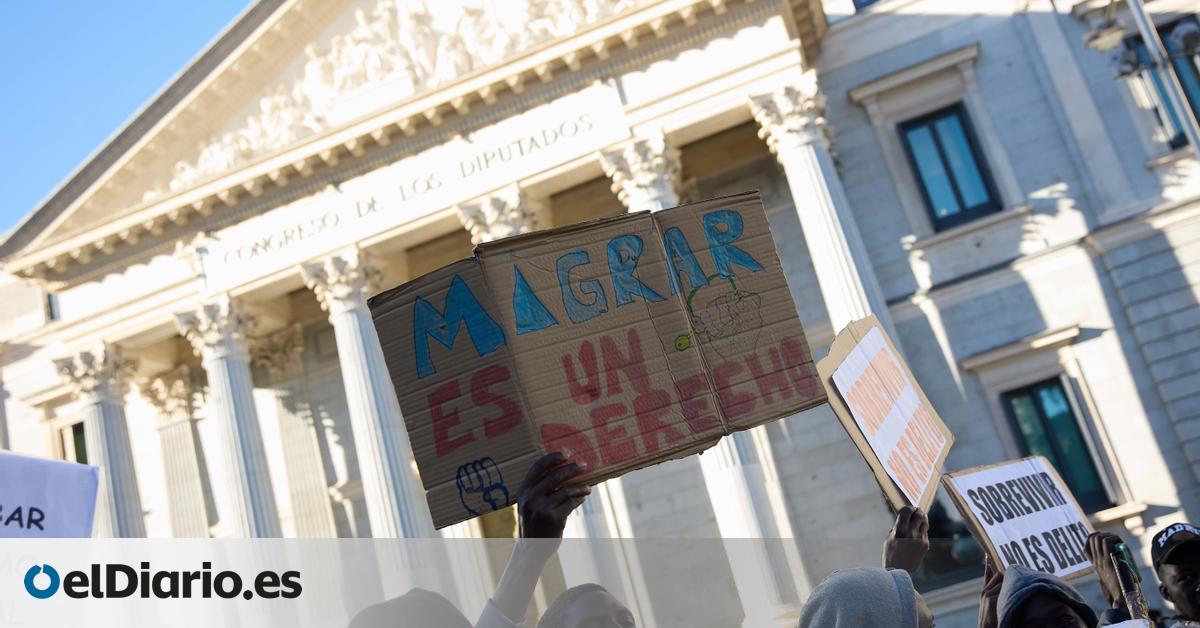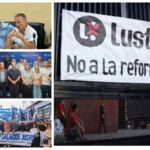
The Popular Legislative Initiative (ILP) for an extraordinary regularization of immigrants had been in Congress for a year, but the government’s socialist wing had always shown reluctance to boost the proposal as requested by the movement that collected more than 800,000 signatures to take it to Parliament. Now, after the criticisms received by the new Foreigner Regulation, which will push thousands of asylum applicants to irregularity, the Executive has urged the processing of the ILP and has shared with the deputies a new proposal that proposes to grant the papers to migrants arrived in Spain before the year 2025, provided that they meet a series of requirements still without specify accessed eldiario.es.
“The Government, through Royal Decree, will regulate the procedure and requirements, within a maximum period of 6 months, to obtain a new authorization due to unique exceptional circumstances, which enables to reside and work throughout the national territory, for those foreign persons who are in Spain before December 31, 2024 and that meet these requirements,” says the draft, which is in a preliminary phase and is subject to changes during the parliamentary process.
What will be those requirements that do not become concretized will be a key aspect for the promoter of the initiative -which asks that it is a procedure with hardly any conditions to avoid leaving people behind -but also for other formations whose parliamentary support will be essential for the initiative to move forward.
So far, the Ministry of Inclusion, Social Security and Migrations had not shown its direct support to extraordinary regularization. Its headline, Elma Saiz, appealed to the new regulation of the Foreigner Law as the ideal way to “stable” flexible the access of foreigners to residence permits, but it has been the lagoons of that same rule that have ended up pushing the Executive to promote the processing of the ILP. Thus, the Moncloa now looks at the regularization due to exceptional circumstances, as a formula to fix part of the effects of its own regulation, which will hinder from now on the regularization of asylum seekers who receive a negative of their request for international protection. It is expected that, if not promoting a solution for them, thousands of people may fall into irregularity for the requirements imposed by the regulation.
Days before the entry into force of the new regulation, whose application began on Tuesday, the Executive shared with the deputies of the Labor Commission a new draft to start working on him in a hurry. In the exposure of text reasons, the Government recognizes the holes left by the new norm as one of the reasons that now pushes it to promote the regularization process, of which the conditions are still unknown. “This reform improves access roads to a residence authorization due to exceptional circumstances to those who are integrated in Spain and who cannot return to their country of origin or origin for various reasons,” he says. “However, despite the fact that this new reform […] There is a significant number of people who will not be able to obtain this authorization despite remaining in Spain for a long time. Such as, for example, people who have given up their application for international protection or people with vulnerability, ”collects the document.
“In that sense, the Government is urged to establish a transitory, exceptional and limited regime in time, regulating a new authorization due to exceptional circumstances unique for those foreign persons who are in Spain before December 31, 2024, and as long as they meet a series of requirements that will be established by Royal Decree,” the text continues.
Parliamentary reactions
This proposal will serve the moment to unlock parliamentary negotiations that had been stagnant weeks. “We are finally going to unlock regularization, we are very happy to change the position of the PSOE,” said the parliamentary spokeswoman of Sumar, Verónica Martínez, who believes that the text “recips enough agreements” between the groups that must now meet for the presentation of the law.
Martínez has specified despite the fact that there are some aspects of the government’s text with which they do not agree and will try to modify during the negotiations that will be opened from now on. Among them, the application period, which they want to extend until the entry into force of the law and not until December 31, 2024. In addition, they want the text to be “as broad as possible” and that it enters into force as soon as possible so they will propose that the implementation of the regulation is set in “two months” and not in six as proposed by the Executive.
“We believe that this ILP should be approved as such, we would not be worth any other rule,” said the spokeswoman to add.
Another of the parties with which the government will have to negotiate to carry out the text is Podemos, which has valued on Tuesday the change of position of the Executive. “It was time for the government to reflect on the importance of not keeping millions of people in exceptionality,” said the general secretary of Podemos, Ione Belarra, at a press conference.
However, it has been quite skeptical with the intentions of the Socialist Party and has ruled out having open “no negotiation with the government.” “If you bring any initiative you can always count on our votes, but we are not in negotiation,” he said. Moreover, he has considered that if the Executive really intends to approve regularization, it could be done through a decree in the Council of Ministers.
“If the government would really want to do extraordinary regularization, it could do it tomorrow,” said Belarra, which has also slipped that the PSOE could use Junts and PNV “as an excuse not to do what they don’t want to do.”
Even with the votes of Podemos, the Government needs the support of the entire investiture block, including those of the Catalan independence and the Basque nationalists. Junts has also deepened in recent months his speech against immigration, although he takes into consideration of the popular initiative came forward with his votes and also with those of the PP. A road, that of the formation of Alberto Núñez Feijóo, that some sources of negotiation also contemplate to boost the initiative.
Source: www.eldiario.es

